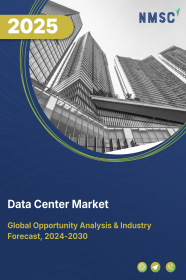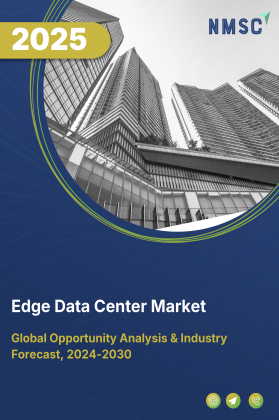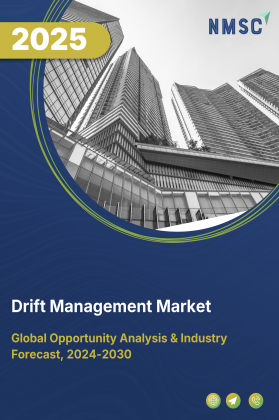
Data Center Market by Infrastructure (Hardware, Software, Services), by Type (Enterprise Data Centers, and others), by Data Center Rating (Tier I, and others), by Size (Small Data Centers, and others), by Server Rack Density (<10kW, and others), by Data Center Redundancy (N+1, and others), by PUE Outlook (Less than 1.2, and others), by Design Outlook (Traditional, and others), by End User (Cloud Service Provider and others) – Global Opportunity Analysis and Industry Forecast, 2024–2030
Industry: ICT & Media | Publish Date: 26-Sep-2025 | No of Pages: 559 | No. of Tables: 706 | No. of Figures: 631 | Format: PDF | Report Code : IC570
Market Overview
The Data Center Market size was valued at USD 214.0 billion in 2023, and is predicted to reach USD 406.6 billion by 2030, with a CAGR of 9.60% from 2024 to 2030.
The data center industry encompasses the planning, construction, operation, and maintenance of infrastructure dedicated to hosting computing resources. This infrastructure includes servers, storage systems, and networking equipment, along with services such as cloud computing and connectivity solutions. Key trends in the industry include the widespread adoption of cloud services, the rise of edge computing to minimize latency, and a growing focus on sustainability.
Additionally, cybersecurity concerns are increasing, leading to heightened security measures. The integration of hybrid and multi-cloud strategies is also prominent, along with the impact of 5G networks. These trends reflect the industry's response to the escalating demand for scalable, efficient, and secure data processing and storage solutions amid the ongoing digital transformation. According to the United States International Trade Commission, the data processing and storage market is projected to increase in value from USD 56 billion in 2020 to USD 90 billion by 2025.
Digital Transformation Accelerates Data Center Market Growth
The surge in digital transformation is significantly driving the expansion of the data center market. As organizations increasingly adopt digital platforms, cloud services, and data-centric operations, the need for scalable, resilient, and high-performance infrastructure has become critical. This shift is further supported by rising investment in digital technologies, with spending expected to reach nearly USD 4 trillion by 2027. Data centers now serve as the backbone of this digital acceleration, enabling businesses to store, process, and manage large volumes of data securely and efficiently.
At the same time, the proliferation of advanced technologies such as artificial intelligence, machine learning, and the Internet of Things is reshaping data center requirements. These innovations demand faster data processing, minimal latency, and higher energy efficiency—pushing operators to adopt next-generation architectures and operational models. The increasing reliance on remote work and digital collaboration also reinforces the importance of robust data center ecosystems. As a result, the market continues to evolve rapidly to support the performance, connectivity, and sustainability needs of modern digital enterprises.
Cloud Adoption Accelerates Data Center Expansion
The rapid adoption of cloud services is a key driver fueling the growth of the data center market. Organizations across industries—including finance, healthcare, e-commerce, and government—are migrating their operations to cloud platforms to enhance flexibility, scalability, and cost-efficiency. This shift has created a substantial need for advanced data center infrastructure capable of supporting cloud workloads, ensuring reliable connectivity, and maintaining data integrity across distributed environments.
Recent forecasts highlight the scale of this transformation, with end-user spending on public cloud services expected to reach nearly USD 680 billion in 2024—a growth of over 20% from the previous year. This surge underscores the critical role of data centers in enabling cloud functionality. In response, providers are accelerating investments in high-performance computing, modular infrastructure, and energy-efficient technologies to support this rising demand. The result is a rapidly evolving data center landscape that is more agile, interconnected, and cloud-centric than ever before.
High Capital Requirements and Regulatory Pressures Restrain Market Growth
Despite strong demand, the data center market faces considerable barriers, with high initial investment being one of the most prominent. Establishing and maintaining data centers requires significant capital expenditure for land, infrastructure, hardware, power systems, and cooling technologies. These costs can be prohibitive for smaller players and emerging businesses, limiting market entry and slowing regional development. Additionally, the ongoing need for technological upgrades to maintain competitiveness further increases financial pressure on operators.
Regulatory and environmental constraints also present challenges for market growth. Governments and regulatory bodies are increasingly enforcing sustainability standards to manage energy consumption and environmental impact. In response, data center operators must invest in greener technologies and more efficient energy use, which adds to operational costs. In several countries, such as Singapore, the Netherlands, and Ireland, moratoriums or restrictions on new data center developments have been introduced to manage strain on power infrastructure and reduce environmental footprints—highlighting the delicate balance between digital expansion and sustainability.
Edge Computing Unlocks Future Growth Opportunities in the Data Center Market
The integration of edge computing is poised to create substantial growth opportunities within the data center industry. By placing compute and storage resources closer to end-users, edge computing significantly reduces latency and enables real-time data processing. This is particularly valuable for supporting next-generation applications such as the Internet of Things (IoT), Augmented Reality (AR), and autonomous systems, which demand rapid response times and localized data handling. By easing the burden on centralized cloud infrastructure, edge computing offers a more efficient and responsive alternative for diverse use cases.
This decentralized model also brings scalability, flexibility, and industry-specific solutions to the forefront, paving the way for the growth of edge cloud services. In addition to performance benefits, edge computing enhances data security by enabling local processing of sensitive information, addressing privacy concerns and regulatory compliance around data sovereignty. As the digital landscape evolves, the demand for low-latency, secure, and reliable infrastructure continues to rise—positioning edge computing as a key enabler of future-ready data center ecosystems and opening up new revenue streams for providers.
North America Dominates the Data center Market
In North America, particularly in the United States, the data center landscape is robust and expansive, with over 5,300 strategically positioned facilities across the nation. Northern California serves as a notable hub for data-intensive enterprises, housing major companies such as Google, Facebook, Uber, Twitter, and Yelp. The distribution of data centers across various jurisdictions reflects the widespread integration of data in the US economy and the influence of cost-effective energy sources in specific regions.
Remarkably, the top 10 data center locations in the US collectively account for less than 40% of all data centers, underscoring the extensive geographic dispersion, with nearly every state hosting at least one data center. Dominated by major players such as Lumen Technology, Verizon, Digital Realty, AT&T, and Equinix, the data center industry in the US is largely consolidated, with these top five operators comprising 25.9% of total US data centers. Moreover, reports indicate substantial contributions to the US GDP by data centers, with a PwC study commissioned by the Data Center Coalition revealing a USD 2.1 trillion boost between 2017 and 2021.
Additionally, data intelligence firm CloudScene highlights the US's significant lead in data center numbers, hosting 5,389 facilities, a figure five times greater than the UK's 512 data centers. Furthermore, substantial investments by tech giants such as Amazon Web Services (AWS), exemplified by a USD 35 billion allocation for new data centers in Virginia, underscore the industry's growth trajectory and its vital role in supporting cloud expansion initiatives, even amidst broader corporate restructuring efforts.
Asia-Pacific is expected to show steady growth in the data center market
The Asia-Pacific data center industry is experiencing significant growth and development, with notable developments in key countries. China leads the region with 440 data centers, driven by its booming digital economy and innovative projects such as the world's first submerged commercial data center. Japan is experiencing significant growth, supported by government subsidies and global collaborations. India, aiming for a USD 1 trillion ICT sector by 2025, attracts significant companies such as OVHcloud and Digital Realty. South Korea plans a 1GW data center campus, emphasizing sustainability.
Australia sees Microsoft's USD 3.4 billion investment as a significant expansion. Indonesia collaborates on a nationwide data center platform, while Singapore focuses on water conservation and energy efficiency. Taiwan's growing data traffic spurs investment, with Vantage Data Centers expanding. Thailand's digitalization fuels Amazon, Google, and Microsoft's USD 8.46 billion investment. New Zealand and Malaysia witness significant data center developments, with Spark New Zealand investing in data centers and Malaysia positioning itself as a regional hub with incentives and NTT's USD 50 million CBJ6 data center.
Competitive Landscape
Several market players operating in the data center market include Equinix, Inc., Digital Realty Trust, Inc., NTT Data Centers, CyrusOne, Inc., Switch, GDS Services Ltd., 21Vianet Group, Inc., China Telecom (Data Centers), CoreSite, QTS Realty Trust, LLC, Telehouse, Centersquare, , Flexential, Vantage Data Centers, DataBank Holdings, Ltd., Cologix, Iron Mountain, Inc., ST Telemedia Data Centre Pte Ltd (STT GDC), EdgeConneX Inc., Switchand and others. These market players are adopting business expansion across various regions to maintain dominance in the data center market.
For instance, in June 2025, Equinix. Inc announced an expansion of its Alcobendas (Madrid) campus, approved as a “Special Action Project” to support AI, IoT, and 5G infrastructure
Also, in June 2025, Digital Trust, Inc. recognized (with Equinix) as a dominant operator in the Netherlands’ data‑centre pipeline, offering robust white-floor and IT power capacity
Moreover, in May 2025, Coresite published its “2025 State of the Data Center” report highlighting trends in AI-driven hybrid IT, interconnection, and colocation
Key Market Segments
By Infrastructure
-
Hardware
-
IT Hardware
-
Servers
-
Storage Systems
-
Networking Equipment
-
-
Power Infrastructure Hardware
-
Uninterruptible Power Supplies (UPS)
-
Generators
-
Automatic Transfer Switches
-
Power Distribution Units (PDUs)
-
-
Mechanical Infrastructure Hardware
-
Computer-Room Air Conditioners (CRAC/CRA Units)
-
Chillers
-
Racks
-
Cable Management Systems
-
- Safety & Security Hardware
-
Fire Suppression Systems
-
Physical Security Systems (CCTV, access controls)
-
-
- Software
-
DCIM & Monitoring
-
Automation & Orchestration
-
Backup & Disaster Recovery
-
Security Software
-
Virtualization Software
-
Analytics & Reporting Software
-
Other Software
-
-
Services
-
Planning & Professional Services
-
Site & Building Design
-
System/Infrastructure Engineering
-
Professional Advisory (Compliance, Energy audits)
-
- Integration & Deployment Services
-
Electrical & Mechanical Installation
-
Commissioning & Acceptance Testing
-
- Operation & Support Services
-
Preventive & Corrective Maintenance
-
Facilities Management / Remote Monitoring
-
Support Services (helpdesk, onsite SLA support)
-
-
Hosting & Managed Services
-
Colocation & Cloud Hosting Services
-
Virtual/Private Hosting Platforms
-
-
By Type
-
Enterprise Data Centers
-
Colocation Data Centers
-
Cloud Data Centers
-
Hyperscale Data Centers
-
Edge Data Centers
-
Micro Data Centers
-
Others
By Data Center Rating
-
Tier I
-
Tier II
-
Tier III
-
Tier IV
By Size
-
Small Data Centers
-
Med-sized Datacenters
-
Large Datacenters
By Power Capacity
-
< 0.01 GW (Small)
-
0.01-0.05 GW (Medium)
-
0.05-0.1 GW (Large)
-
0.1-0.5 GW (Hyperscale)
-
> 0.5 GW (Mega-campus)
By Server Rack Density
-
<10kW
-
10-19kW
-
20-29kW
-
30-39kW
-
40-49kW
-
>50kW
By Data Center Redundancy
-
N (No Redundancy)
-
N+1 (Single-fault tolerant)
-
N+2 (Dual-fault tolerant)
-
2N (Full duplication)
-
2N+1 (Concurrently maintainable + extra spare)
-
3N/2N+2 (multi-backup fault tolerant)
By PUE Outlook
-
Less than 1.2
-
1.2 - 1.5
-
1.5 - 2.0
-
Greater than 2.0
By Design Outlook
-
Traditional
-
Containerized
-
Modular
By End User
-
Cloud Service Provider
-
Technology Provider
-
Telecom
-
Healthcare
-
BFSI
-
Retail & E-commerce
-
Entertainment & Media
-
Government
-
Energy
-
Others
By Region
-
North America
-
The U.S.
-
Canada
-
Mexico
-
-
Europe
-
The UK
-
Germany
-
France
-
Italy
-
Spain
-
Denmark
-
Netherlands
-
Finland
-
Sweden
-
Norway
-
Russia
-
Rest of Europe
-
-
Asia-Pacific
-
China
-
Japan
-
India
-
South Korea
-
Australia
-
Indonesia
-
Singapore
-
Taiwan
-
Thailand
-
Rest of Asia-Pacific
-
-
Rest of the World (RoW)
-
Latin America
-
Middle East
-
Africa
-
Key Players
-
Equinix, Inc.
-
Digital Realty Trust, Inc.
-
NTT Data Centers
-
CyrusOne, Inc.
-
Switch
-
GDS Services Ltd.
-
21Vianet Group, Inc.
-
China Telecom (Data Centers)
-
CoreSite
-
QTS Realty Trust, LLC
-
Telehouse
-
Centersquare
-
Flexential
-
Vantage Data Centers
-
DataBank Holdings, Ltd.
-
Cologix
-
Iron Mountain, Inc.
-
ST Telemedia Data Centre Pte Ltd (STT GDC)
-
EdgeConneX Inc.
-
Switch
Report Scope and Segmentation
|
Parameters |
Details |
|
Market Size in 2023 |
USD 214.0 Billion |
|
Revenue Forecast in 2030 |
USD 406.6 Billion |
|
Growth Rate |
CAGR of 9.60% from 2024 to 2030 |
|
Analysis Period |
2023–2030 |
|
Base Year Considered |
2023 |
|
Forecast Period |
2024–2030 |
|
Market Size Estimation |
Million (USD) |
|
Growth Factors |
|
|
Countries Covered |
28 |
|
Companies Profiled |
20 |
|
Market Share |
Available for 10 companies |
|
Customization Scope |
Free customization (equivalent up to 80 working hours of analysts) after purchase. Addition or alteration to country, regional, and segment scope. |
|
Pricing and Purchase Options |
Avail customized purchase options to meet your exact research needs. |

















 Speak to Our Analyst
Speak to Our Analyst

























